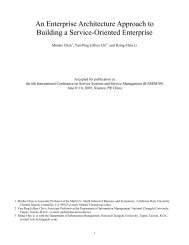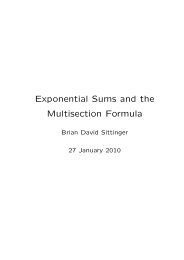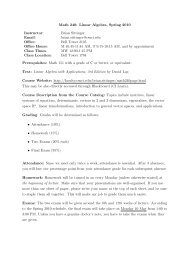MEMORANDUM ASCSU Senator - CSU Channel Islands
MEMORANDUM ASCSU Senator - CSU Channel Islands
MEMORANDUM ASCSU Senator - CSU Channel Islands
You also want an ePaper? Increase the reach of your titles
YUMPU automatically turns print PDFs into web optimized ePapers that Google loves.
At its first meeting, on June 19, 1961, the newly formed Board of Trustees of the California State<br />
Colleges voted to maintain a system-wide graduation requirement in American Institutions. The<br />
new requirement took effect on July 1, 1961 exactly fifty years ago today. 2 Later enshrined as<br />
Article 5, Section 40404 of the Administrative Code of the <strong>CSU</strong> system (Title 5), this<br />
requirement has been maintained by every succeeding Board of Trustees. The baton has been<br />
passed for fifty years from Board to Board, with support from all ends of the political spectrum.<br />
Rarely has one policy in the civic arena drawn such consensus.<br />
The California Legislature’s Joint Committee for Review of the Master Plan for Higher<br />
Education reaffirmed the state’s commitment to civic education in a 1989 report, saying:<br />
We in the Legislature are charged with a broader responsibility, to define the parameters<br />
of the public interest in education and in the definition of the educated citizen as<br />
California approaches the 21st Century. We have no desire to write curricula or<br />
determine professional standards. Instead, we seek to clarify what California's people can<br />
broadly and appropriately expect from higher education.<br />
We make here our basic claim: that the future social, economic, and cultural development<br />
of California demands an education for responsible citizenship in a Multicultural<br />
Democracy.<br />
They have a right to expect an education which empowers them intellectually, morally,<br />
and vocationally. They can expect an education which offers them an opportunity to<br />
become fully thoughtful citizens, which provides them an occasion for engaging the<br />
enduring questions in our evolving and complex culture, and which gives them<br />
hopes of becoming fully responsible, productive, and satisfied participants in<br />
California's developing multicultural society. 3 (emphasis added)<br />
The appalling state of civic knowledge among Americans and Californians provides evidence of<br />
the importance of the American Institutions graduation requirement in contemporary American<br />
society. We must be concerned about the data indicating that civic education is vitally necessary<br />
today, perhaps more than ever. One recent study summarized the consensus among specialists<br />
thusly: “Few people dispute the well-established conclusion that most individual voters are<br />
2<br />
Board of Trustees Minutes and Agendas, June 19, 1961, <strong>CSU</strong> Archives, California State University Dominguez<br />
Hills, box 1, folder 10.<br />
3California<br />
Faces, California's Future: Education for Citizenship in a Multicultural Democracy, produced by the<br />
Joint Committee for the Review of the Master Plan for Higher Education, March 1989, pp. 97-98.<br />
3

















